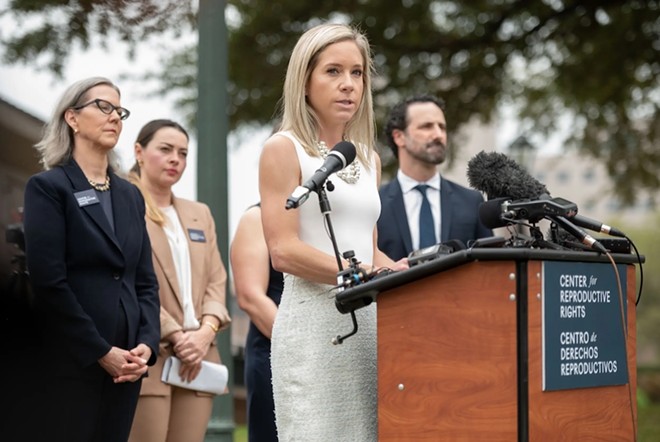
These are believed to be the first women in the country since 1973 to testify in court about the impacts of a state abortion ban on their pregnancies. They almost certainly won’t be the last.
Speaking to a packed Travis County courtroom Wednesday, three women detailed devastating pregnancy losses and said medically necessary care was delayed or denied due to their doctors’ confusion over Texas’ abortion laws.
They’re challenging a clause in the state’s abortion ban that says a doctor can perform an abortion only if they believe the patient has “a life-threatening physical condition aggravated by, caused by, or arising from a pregnancy” that puts the patient “at risk of death or poses a serious risk of substantial impairment of a major bodily function.”
Doctors have reported delaying necessary pregnancy care for fear of violating the law, which allows doctors to be punished by up to 99 years in prison, a $100,000 fine and the loss of their medical license. The lawsuit, brought by the Center for Reproductive Rights, asks a judge to temporarily block the law from applying to medically necessary abortions and ultimately clarify when a medical emergency justifies an abortion.
Texas is asking District Judge Jessica Mangrum to dismiss the case, arguing these women have only their doctors to blame for any disruptions to their care.
At the end of each tearful testimony, lawyers for the state asked the women the same questions: Did Attorney General Ken Paxton tell you you couldn’t get an abortion? Did anyone, working in any capacity for the state, tell you you couldn’t get an abortion?
Amanda ZurwaskiAs soon as the U.S. Supreme Court overturned Roe v. Wade and allowed states to set their own laws about abortion, Texas descended into legal uncertainty. The state already banned nearly all abortions after about six weeks of pregnancy, enforced entirely through private lawsuits. The day of the ruling, Paxton issued guidance indicating that the state’s pre-Roe statutes, which have been on the books since before the Civil War, were also in effect.
Before a court could confirm whether Paxton’s guidance was accurate, the state’s “trigger ban” went into effect, banning all abortions from the moment of conception, with only an exception to save the life of the pregnant patient.
Amanda Zurawksi learned the trigger law had gone into effect from a hospital bed in Austin, watching the only channel she could get on the television. She was in septic shock and would eventually spend three days in the intensive care unit.
Just three days prior, Zurawksi had been proceeding through her pregnancy as planned, carrying a baby girl she and her husband had hoped, prayed and endured grueling rounds of fertility treatments to conceive.
She suddenly noticed fluid leaking down her leg and her body felt wider than usual. Her cervix was dilating early, and she had lost the amniotic fluid she needed to maintain her pregnancy. Her doctor told her “miscarriage was inevitable,” she testified Wednesday, but since there was still a fetal heartbeat, they could not induce labor.
She went to the hospital for a second opinion and heard the same verdict: She would have to wait until she miscarried naturally, or got sick enough that doctors felt legally safe to induce an abortion. She considered traveling to a state where abortion remains legal, but her doctors told her the situation was so dire she needed to stay within 15 minutes of a hospital.
Zurawksi was devastated, grappling with the sudden loss of her pregnancy, the confusing medical advice, and the hesitation and fear she sensed from all the doctors and nurses. Every time they checked the baby’s heartbeat, Zurawksi was forced to cartwheel through the stages of grief all over again.
“I had to listen to her heartbeat, simultaneously wanting to hear it and not wanting to hear it at the same time,” she said on the witness stand Wednesday, speaking through tears. “If it stopped, they would be able to intervene.”
She was at home when she started to descend into septic shock. She was shaking, her teeth chattering, so freezing cold despite the August heat in Austin. Her husband rushed her to the hospital, where they pumped her with antibiotics. Finally, her doctor agreed to induce labor. She delivered a deceased daughter.
They named her Willow, after a tree that grows both in Central Texas, where the Zurawksis live, and Indiana, where they are from. It means “strength in adversity,” she said Wednesday. They plan to plant a willow tree in her honor at their new house, which they bought when they learned they were pregnant.
Zurawksi and her husband would still like to have children, but tests have revealed significant scarring and damage to her reproductive organs as a result of the infection.
Zurawski said she didn’t blame her medical providers, who were rightfully fearful in the early, confusing days after the trigger law went into effect. She said Wednesday that she blames only “the people who support these bans.”
Samantha CaisanoSpeaking to a courtroom full of lawyers, reporters and supporters, Samantha Caisano described the day she held her baby daughter, Halo, and watched her gasp out her first and final breaths. Over the course of four hours, Halo went from pink to red to purple, from being warm to cold, Caisano said Wednesday.
As she held her little body, Caisano apologized, again and again.
“I was so sorry that I couldn’t help her or release her going to heaven sooner rather than later,” Caisano recounted for the court through sobs. “I felt so bad. She had no mercy. There was no mercy there for her, and I couldn’t do anything.”
When Caisano learned her fetus had anencephaly, a fetal anomaly that prevented the skull and brainstem from developing fully, she thought maybe she could have surgery to fix it. Her doctor explained the diagnosis was “incompatible with life” — Halo wouldn’t survive outside the womb — but offered little in the way of options.
Casaino considered traveling out of state, but with a job, persistent car trouble and other children waiting for her at home, she couldn’t figure out a way to make the long trip in a hurry. So she carried the pregnancy for an additional 13 weeks before eventually going into labor.
As Casaino described the experience to the court, she began to cry, then she began to cough, then she threw up in her hands, as her husband and a bailiff rushed to the witness stand with wastebaskets.
When the court reconvened, she explained in a small, sad voice that she never used to throw up, but now, it happens all the time.
“I vomit when certain parts of what happen just kind of make my body remember and it just reacts,” she said.
On cross-examination, the state questioned Caisano’s prescription for antidepressants, which her doctor increased after the diagnosis, and asked whether Paxton or anyone from the state had told her she couldn’t have an abortion.
“I almost want to say yes,” she said, noting that if she’d had a chance to ask anyone at the state, they would have told her there was a law in place that prohibited doctors from performing abortions in most cases.
But no, she said. No one from the state told her anything.
A new era of legal challengesOver the past few decades, the Center for Reproductive Rights and the attorney general’s office have found themselves in a courtroom just like this one countless times, arguing over the legality of Texas’ abortion laws. Historically, abortion providers were named on the lawsuits and testified on the stand, in an effort to spare the women most impacted by these laws from the pain of public testimony.
But there are no more abortion clinics in Texas. These women took the stand Wednesday because there is no one else left to speak for them.
“The differences in the parties positions boil down to this: The state wants to err on the side of preventing more abortions, even if it harms women and their families,” said Molly Duane, senior staff attorney for the Center for Reproductive Rights, “while the plaintiffs want to err on the side of protecting the lives, health and future fertility of all Texans. This is the bare minimum that Texans are entitled to under the law.”
During the most recent regular legislative session, Texas passed a law that provided some additional protections for doctors who perform abortions in cases of ectopic pregnancies and previable premature rupture of membranes, both of which can be fatal if left untreated. The law goes into effect Sept. 1.
Assistant Attorney General Amy Pletscher said while these women’s stories are “indisputably tragic,” they do not warrant a judge taking steps to modify the laws.
“Any future harm is purely hypothetical and therefore does not warrant injunctive relief,” Pletscher told the judge. “Given the nature of plaintiffs’ past experiences, it is understandable that they are seeking to place blame, but the blame directed at defendants is misplaced. Rather, plaintiffs sustained their alleged injuries as a direct result of their own medical providers failing them.”
Standing before the judge Wednesday, Duane said the state has long argued that clinics do not have standing to challenge abortion law and claimed it is unlawful to challenge abortion laws before they go into effect. But now that the Center for Reproductive Rights has brought a suit with plaintiffs who are directly harmed as a result of the trigger law, the state still says there are no grounds for a suit.
“It begs the question: Does the state think that the only person who would have standing to challenge an abortion law is a woman who comes to court with amniotic fluid or blood dripping down her leg?”
This article originally appeared in the Texas Tribune.
The Texas Tribune is a member-supported, nonpartisan newsroom informing and engaging Texans on state politics and policy. Learn more at texastribune.org.
Subscribe to SA Current newsletters.
Follow us: Apple News | Google News | NewsBreak | Reddit | Instagram | Facebook | Twitter| Or sign up for our RSS Feed















